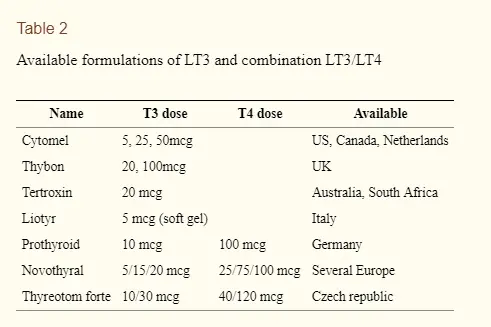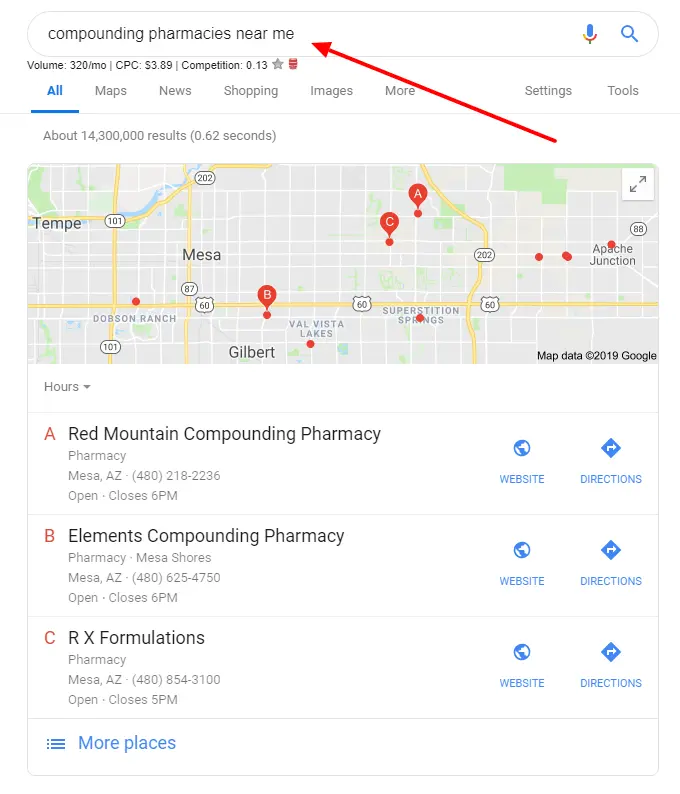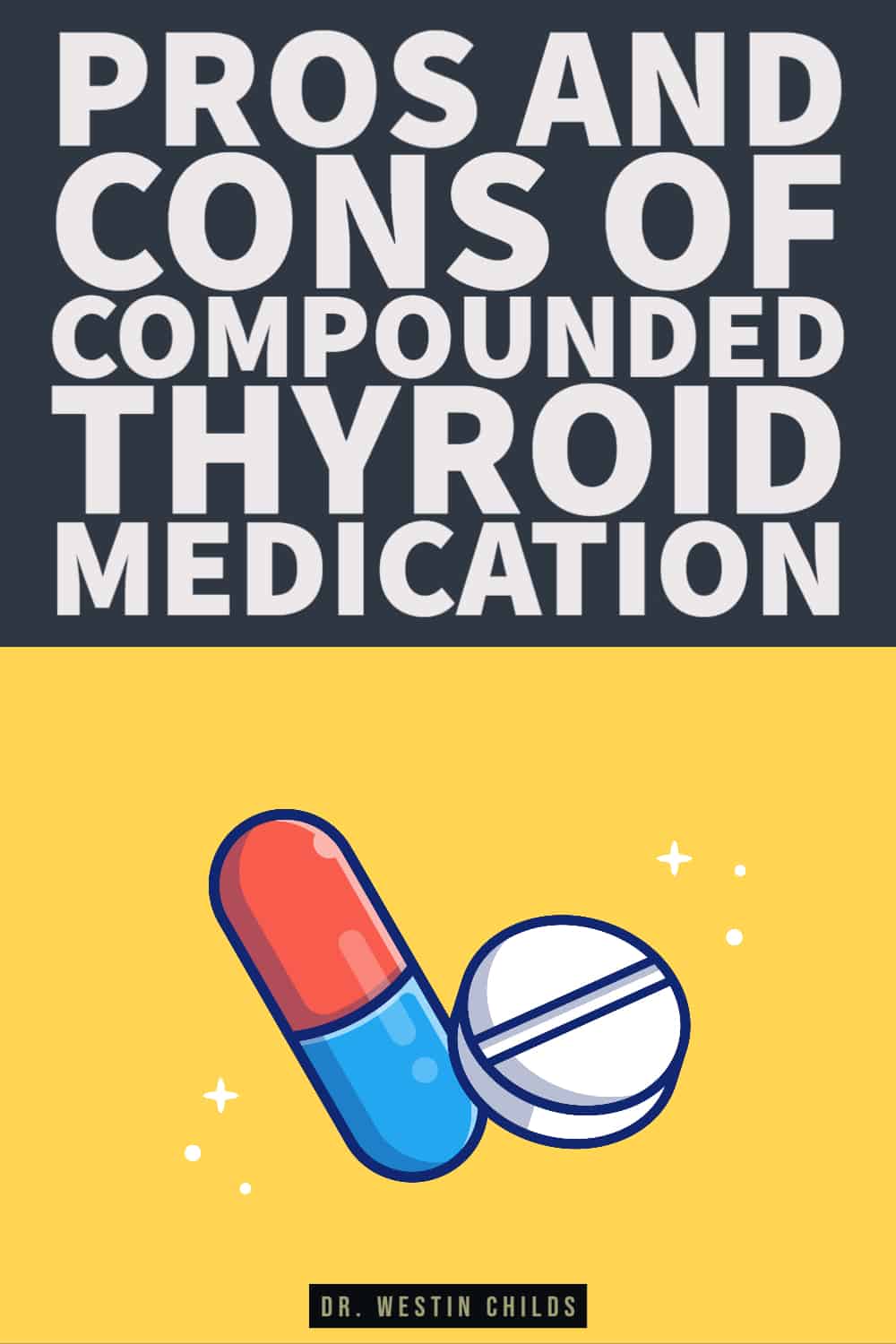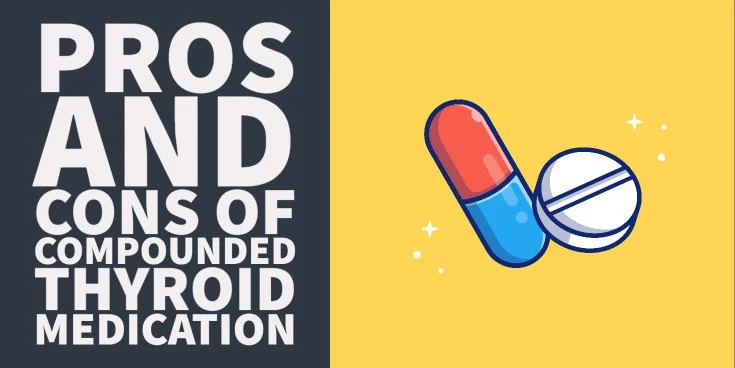Whether you realize it or not as a thyroid patient you actually have many options when it comes to thyroid medications.
Your doctor might have you believe that the one and only thyroid medication available is Synthroid/levothyroxine but that couldn’t be farther from the truth.
There are actually many different types of thyroid medications that are FDA approved to treat hypothyroidism (1) (which means low thyroid function) and are available in the United States.
You are probably well aware of Synthroid/levothyroxine but others on this list include medications such as Tirosint, Cytomel, and liothyronine.
Article highlights:
- Compounded thyroid medications are unique among all types of thyroid medication
- You can individually titrate your T4 and T3 dose to fit exactly the demands of your body
- All medications have side effects and drawbacks but these can be minimized
- Compounded thyroid medications are available only at compounding pharmacies and require a doctor’s prescription
DOWNLOAD FREE RESOURCES
Foods to Avoid if you Have Thyroid Problems:
I’ve found that these 10 foods cause the most problems for thyroid patients. Learn which foods you should avoid if you have thyroid disease of any type.
The Complete List of Thyroid Lab tests:
The list includes optimal ranges, normal ranges, and the complete list of tests you need to diagnose and manage thyroid disease correctly!
What is Compounded Thyroid Medication
All of these medications have potential advantages and disadvantages and should always be considered!
While they are all approved to treat hypothyroidism they differ in the exact amount of hormones that they provide your body when you ingest them.
The most common thyroid medications prescribed include those which contain the most abundant thyroid hormone in your body known as T4 or thyroxine.
These medications are incredibly stable and have a long half-life but they require activation by certain enzymes in your body.
Other medications contain the most powerful and active thyroid hormone known as T3 or triiodothyronine.
T3 is incredibly potent but suffers from a short half-life and it can pack quite a kick.
The medication that I want to focus on today is one option that doesn’t get a lot of attention and it’s known as compounded T4 and T3 thyroid medication.
It’s unique among all of the other thyroid medications in that it is created only at compounding pharmacies.
These pharmacies are specialty pharmacies (very different from your standard run-of-the-mill Walgreens and CVS’s) that can formulate medications to fit your specific needs.
Instead of standardized ingredients and dosages, such as those found within levothyroxine and Synthroid, compounding pharmacies can alter the doses of each thyroid hormone component and add it to an array of binders and fillers to match what your body needs.
Unfortunately, you’ve probably never heard of compounding pharmacies because most conventional doctors (meaning those doctors who are endocrinologists and primary care providers) don’t really like these types of pharmacies.
They often believe that the formulations are not safe and may present a danger to patients due to some regulations (2).
My experience suggests that compounding pharmacies are quite safe and that there are many thyroid patients who can benefit from using compounded thyroid medications which is exactly what we will focus on today.
How Does it Compare to Other Thyroid Medications?
Compounded thyroid medications are not unlike other thyroid medications and formulations in that they all contain the same thyroid hormones.
You may not realize it but all of your thyroid medications basically contain the same two active ingredients:
- Thyroxine (known as T4)
- Triiodothyronine (known as T3)
These two thyroid hormones represent the two most biologically active thyroid hormones that your thyroid gland produces when it is healthy.
ALL thyroid medications contain one or both of these hormones in various quantities and dosages.
They also differ in the carriers, binders, fillers, and dyes found in the capsule/tablets.
It may not sound like a lot but each of these factors can and absolutely may influence how you feel when taking these medications.
Because of this, it’s important for you to at least be aware that they exist.
Why?
Because if you are someone who is not doing well on one type of thyroid medication then improving your outcome may be as simple as switching from one to another, even if they are within the same class of medications.
For instance:
Recent studies have shown that thyroid patients react differently to name brand Synthroid compared to generic levothyroxine (3).
And this same logic can be applied to compounded thyroid medications.
Compounded thyroid medications often contain both T4 and T3 and they can be dosed such that your medication provides you the same ratio that your thyroid gland produces when it is healthy.
This ratio is approximately 80% T4 and 20% T3 depending on which study you are looking at (4) and this is a great place to start when considering altering your medication.
Newer studies, such as this one from 2018 (5), support the idea that certain patients benefit from using combination medications compared to single hormone thyroid medication.
Advantages of Compounded T4 and T3 Thyroid Medication
Perhaps the greatest benefit to compounded thyroid medications is that you have the option to provide the exact dose of T4 and T3 that you want for the patient while controlling the inactive binders/ingredients that come with it.
This means that you can provide your body with quantities and dosages which are not possible with standardized thyroid medications such as Synthroid/levothyroxine.

For instance:
Let’s say that your doctor starts you on 50mcg of T4 in the form of Synthroid and 25mcg of T3 in the form of Cytomel.
Let’s assume that you are doing well on this formulation but you are not at 100%.
After looking at your labs you see that your free T3 is lower than it should be but your TSH is lower than you want it as well.
Your doctor could then adjust your medication to include 40mcg of T4 and 28mcg of T3.
This allows for the potential to alter both T4 and T3 levels simultaneously based on your thyroid lab tests.
Do you see the power here?

This sort of dosing is not available with any other type of thyroid medication because they come in standardized doses.
Beyond this primary benefit I think there are also several other benefits to using compounded thyroid medications:
- Your doctor can customize the amount of thyroid medication in each dose
- Most compounded medications contain fewer inactive ingredients and binders when compared to brand/generic thyroid medications
- Can be compounded for ‘sustained released’ which means you may not have to take multiple doses throughout the day
- Sometimes compounded medications are the only way to get T3 medication (depending on which country you live in)
Disadvantages (And Side Effects)
It’s not always sunshine and rainbows, however, as these medications do have some potential drawbacks, not unlike any other thyroid medication on the market.
Before you use any thyroid medication (or any medication in general) you should be aware of the potential drawbacks, side effects, and benefits.
Normally, your doctor should be explaining this information to you before you use it but this may not be the case given that doctors are spending less time with patients.
My recommendation is to be deliberate with your choice of thyroid medication and attempt to match your medication to your sensitivities and the needs of your body.
It’s a good idea to keep track of this information and how you feel after starting new medications with a journal.
Some disadvantages of compounded thyroid medication include:
- Does not contain other thyroid gland ingredients such as Calcitonin (6) and T1/T2 (7).
- Now always covered by insurance (may be more expensive).
- Inactive binders such as cellulose and methyl-cellulose delay absorption (8) but may result in decreased serum levels for certain people (especially those with GI issues).
- Not all compounding pharmacies have the same standards in terms of quality.
- Difficult to titrate compared to standard thyroid medication doses.
Remember:
These are potential drawbacks.
Just because you are using compounded thyroid medication does not guarantee that you will experience these consequences, but they are things you should be aware of.
Side effects of compounded thyroid medications include all of those found with other thyroid medications including:
- The risk of taking too much thyroid medication and becoming hyperthyroid (this can occur with ANY thyroid medication)
- The risk of taking too little thyroid medication and staying hypothyroid (this can occur with ANY thyroid medication)
- Direct side effects of the medication itself including things such as hair loss (this is rare but does happen)
- Direct side effects of the binders/fillers which includes symptoms such as nausea, stomach upset, indigestion, reduced medication absorption, and acid reflux.
- Hypersensitivity reactions to binders/fillers which includes symptoms such as headaches, rashes, and nausea.
How Much Does it Cost?
You will find that prices from compounding pharmacies tend to vary.
Because of this, the best way to determine how much your thyroid medication will cost (if it is compounded) is to call a local compounding pharmacy and to ask them.
You can find compounding pharmacies by searching directly on google:

Typing “compounding pharmacies near me” should pop up several options for you to call.
You can call them directly and ask about how much it would cost to have your medication compounded.
**Related quick tip: It might be a good idea to ask the compounding pharmacy you are calling if they have any references for thyroid doctors! They often have relationships with local doctors who are more open-minded.
My own personal experience suggests that you should be able to find a compounding pharmacy which charges somewhere between $30 and $60 per month (depending on your dose and which binders they use).

You will also find that some compounding pharmacies attempt to use your insurance as well which may further reduce the cost to you.
However, be aware that this option is not available for everyone, so it’s probably more realistic to expect to pay out of pocket for this type of medication.
My opinion is that it’s worth the potential loss of $30-$60 if it means dramatically improving your overall health and reducing your hypothyroid symptoms.
I find that most people who use compounded thyroid medications often feel better on these medications when compared to standard thyroid medication such as Synthroid.
This is not a universal truth, but it tends to be true for most people.
How to Get Compounded Thyroid Medication
Compounded thyroid medication, like other thyroid medications, is only available with a prescription from a doctor.
This may not be true for everyone reading this as some of you come from countries where you can pick up prescription medications over the counter but if you are in the United States then it will require a prescription from a licensed doctor.
But just because you have a current doctor does not necessarily mean that they will be willing to write you a prescription for compounded thyroid medication.
As I stated previously, some doctors do not believe that compounding pharmacies are safe (despite the fact that thousands of thyroid patients use their medications on a daily basis).
The only way to determine if your doctor is willing to prescribe this medication is to simply ask them.
If you find that they are unwilling to prescribe anything other than Synthroid or levothyroxine then it may be time to seek a second opinion or look for a doctor who is more willing to work with you and your situation.
Hypothyroidism is not a one-size-fits-all type of disease.
Each patient will require a different approach to management and part of that management includes different types and doses of thyroid medication.
If you are having trouble finding a doctor who is willing to work with you be sure you check out this free resource which is designed to help you find a local thyroid literate doctor.
Conclusion
Compounded thyroid medication is one of many types of thyroid medications available in the United States.
It contains some specific benefits which are unique to this class of thyroid medication and not shared with other thyroid formulations.
Despite these benefits, however, not everyone will necessarily need compounded thyroid medication from their doctor.
Before you decide to use it be sure you check out the potential benefits and side effects and weigh those options for your specific situation.
Now I want to hear from you:
Are you someone who is currently taking compounded thyroid medication right now?
If so, how are you doing on it?
Have you taken it in the past? If so, how was your reaction and why aren’t you taking it now?
Please share your questions or comments as they can help future thyroid patients figure out what is optimal for their body.









Dr. Childs, I am in California, last year my compounding medication was recalled by the FDA and I can no longer get the help I need because I am allergic to the other typical meds. Do you have any suggestions?
Hi Cheryl,
There are many types of thyroid medications available and you shouldn’t have a problem getting your dose in something like a combination of Tirosint + Cytomel or SR T3.
Dr. Childs, I am currently taking a thyroid compound, T3 6 mcg, T4 35 mcg. I took one capsule in the a.m., one capsule at night each day.
I was feeling great! But my last labs showed a very low TSH, so my Dr. Suggested taking just one capsule twice a week.
I did that, and shortly after felt horribly hypo again. More labs showed exactly that, so have begun the twice a day regimen again. It’s been 2 weeks now, & although I do feel better, it seems to be taking longer to get back to where I was, feeling great.
My question is: I recently came down with a severe case of sinusitis, so am taking amoxicillin twice a day. Can taking this at the same time I’m taking my thyroid compound decrease the effectiveness of the thyroid compound?
Hi Judith,
You never want to take any supplement or medication at the same time as your thyroid medication as that can definitely cause issues. It’s not unique to compounded thyroid medication, though, as it can occur with all thyroid medications.
Dr. Childs,
I recently switched to a compounded T3 (15mcg)/T4(64mcg). I felt much more tired the first 2 weeks. My primary doctor ordered a thyroid panel and hormones to be tested again. I was on:
Synthesis-100mcg
Armour Thyroid- 30 mcg
Cytomel- 5 mcg
I should get results from the blood work tomorrow. I stumbled across your articles over the weekend. I charted my labs from the last 5 years. I’m kicking myself for. Or doing this sooner! I used your conversation formulas to get my ratios and determine optimal levels. I am WAY off! Hoping to get to my optimal levels soon! So grateful for your knowledge and explanations!
Hi Colleen,
Thanks for sharing! Glad you find them helpful 🙂
Your thoughts on Armour Thyroid?
Hi Kathleen,
It’s a fine medication but not my favorite among NDT formulations. I have a ton of information on Armour thyroid in the links below:
– https://www.restartmed.com/armour-thyroid-weight-loss/
– https://www.restartmed.com/6-problems-with-natural-desiccated-thyroid-hormone/
– https://www.restartmed.com/np-thyroid-vs-armour-thyroid/
It is always assumed that those with thyroid issues are under active.
What about those that suffer from overactive thyroids?
I am in the UK.
Taking Carmizamole and being told that I have to have my thyroid removed as to take this long term is a cancer risk.
Hi Patricia,
I typically talk primarily about hypothyroidism (underactive thyroid) because it’s by far the most common type of thyroid disease and eventually all HYPERthyroid patients will eventually become HYPOthyroid. The reason is that the treatments for hyperthyroidism (thyroid removal or RAI) ultimately lead to hypothyroidism when the thyroid gland is removed/destroyed. Once that happens, as it sounds like it is imminent in your case, then this information will be 100% relevant to you.
I do have other articles on hyperthyroidism, though, that you can take a look at here: https://www.restartmed.com/category/thyroid/hyperthyroidism/
It has been 42yrs since my thyroid was taken out because I was diagnosed with thyroid cancer at the age of 21yrs old now 62yrs of age. So with my thyroid and parathyroid removed, can some other meds help outside Synthroid. The biggest problem is with weight and hair not growing back. Back in 1977 a lot of what is done now for thyroid wasn’t done. I have to work so hard just to lose 1 pound and no matter what I take or do my hair won’t grow back.
Hi Carolyn,
If your question is whether or not the right thyroid medication may help with both hair growth and weight loss, the answer is almost certainly yes. The degree to which it may help will vary based on other circumstances and variables but it will certainly help.
You can read more about the various thyroid medications here: https://www.restartmed.com/thyroid-medication/
Hi Dr Childs,
I am prescribed 100mcg levothyroxine and I also take Tiromel 12.5mcg (half a 25mcg tab) which I buy myself.
I was taking 25mcg Tiromel, but my last test results showed T4 at 19, near the upper limit of the range and my T3 was over the top of the range, so I reduced it a bit.
However, I still can’t lose any weight, I have a huge increase in weight around the abdomen since menopause last year, my hair is falling out and I generally don’t feel better.
I also have Chronic Fatigue Syndrome.
How come I can’t drop any weight at these levels? Thanks.
I felt so much better on compound meds than any other meds. I will go back to taking them. My F t3 was a little low at 3.2. Should I increase??
Dr. Childs, My MD told me that taking both T3 and T4 together to treat my hypothyroidism puts me at a high risk for A-Fib because I am just over age 70. I can’t find any information about this danger on the web, and my Naturopathic Physician disagrees with this increased risk for people my age taking both T3 & T4. I feel better when I take both of these drugs. Please share your experience with this risk factor. Thanks!
Hi Mic,
You can learn more about the risk associated with heart disease (and a fib) here: https://www.restartmed.com/suppressed-tsh/
Dr Child’s, could you explain how one of the disadvantages our decreased serum levels? Not to familiar with what that is. I do know I have trouble getting the thyroid medication into my cells. I do take compounded T3/T4
Hi Teri,
The serum levels of thyroid hormone help dictate how functional your thyroid is for your body. So the lower those levels are the more likely you are to feel hypothyroid. Hopefully, this helps clear up the confusion!
I live in Canada and I have been taking Cytomel and Liothyronine for several years now as I cannot tolerate Synthroid or medication made from pigs, they cause terrible stomach cramps. I found that with the compounded medication I have been able to feel well, but still struggle with weight gain. I have Hasimoto’s and even on meds have high antibodies. Also my labs show high T3 levels but I have no symptoms of being hyperthyroid. I tried reducing the dose but symptoms of hypothyroidism return. I have just started CBD oil in a small dose to see if it helps. I love this site as you provide so much useful information. Thank you Dr. Childs!
Hi Carol,
No problem and glad you find it helpful! 🙂
Hi, my iodine & bromine levels are really high and I have a metal taste all day long. Could this be from my Levothyroxine and liothyronine. I’ve been on them for like 20 years.
Thank so much,
Rose
Hi Rose,
Probably not 🙂
I took Pegintron for Hepatitis C in 2007. It cured the Hepatitis but destroyed my Thyroid function and gave me Psoriasis. I’m taking Armour Thyroid 60 mg. in the morning, 15 mg in mid afternoon and 7.5 around 6PM. It seemed to be the right choice for a long while, but now I can suddenly become tired and foggy as the day goes on. I have tried Nature Throid. Didn’t do well. I’m considering switching to either Synthroid or Levothyoxine with Cytomel. I just don’t know which of the first two is best, I hear so many things. Is one generally better than the other? Thank you.
Sorry I forgot to mention Tirosint as one of my considerations too.
I’m taking compounded t4 t3 for first time and am at the end of my first month. Sustained release. *I’ve always had GI issues for sure. I’m have some fatigue in afternoon especially, hair is worse, acid reflux, weight gain, swelling ( also have RA), felt like I had something stuck in my throat, and menstrual issues plus constipation. Thinking of switching to titrating compounding pharmacy and not getting sustained release due to my gut issues. Maybe changing the filler to Advicel.
Unless I missed it, I don’t see any information on compounding NDTs. Surely compounding pharmacies must be able to get Porcine product. It would be nice if that was a possibility. Since changing from Nature-throid to Armour I have felt worse than usual.
Thanks for any information you can provide.
Hi Rhonda,
I’ve never prescribed it but I believe it is possible to get compounded NDT and then pick and chose the fillers/binders.
Dr. Childs, I wish you would take new patients but I do understand. My thyroid has been removed 5 years ago and I am still having problems. I live in Alabama and my question is do you know of a doctor in Alabama or northern part of Florida that has a practice as you do.
Thank you,
Sandra Glass
I was taking nature throid until they quit making it. Can they compound nature throid without any gluten or contamination. I have Celiac.
And also, I’ve taken omeprezole since 2004. Do you have any suggestions as to what to take in place of it, that’s natural?
Hi Yvonne,
Suggestions for what to take in place of Nature-throid or omeprazole?
Hello!
Thanks for all of the great information!
I take Synthroid and recently added SR T3.
For the week I took the SR T3 all of my joints swelled and I had migratory joint pain in knees, elbows, shoulders and a headache. I stopped taking the SR3 for one day and felt better. Do some people have a systemic immune reaction to SR T3? I like the idea of SR but it made me feel horrible. What is the cleanest T3 with least amount of ingredients?
Hi Susan,
It would really depend on how your SR T3 is compounded. I’ve never seen that reaction as most compounding pharmacies use methylcellulose as the binder which is inert.
Hello Dr. Childs,
My thyroid symptoms are really bad right now. Weight, brain fog, blurry eyesight, exhaustion…I have been working on lowering my high nighttime cortisol and take compounded t4/t3 (114,27 mcg). Not sure if this dosage is high enough…My t4 and t3 are very low with a high Rt3. It was a slow release which has been changed due to raising my tsh to 9.5. My doctor is recommending adding Cytomel instead of increasing t3 from compounded medication. Are there side effects of taking Cytomel or should I just have my Dr. raise t3 in my compounded meds? She said it’s easier to add cytomel than keep adjusting compounded meds to find right dosage.
Thank you!
Hi Char,
You can find a list of Cytomel-related side effects here: https://www.restartmed.com/cytomel-side-effects/
Dr child’s
2020 I was placed on compounded NP thyroid my hair was falling out .
Then Levothyroxine 2 no problem
This year I was placed on compounded T3 only …my hair has slowly been falling out . I have been losing weight unintentionally.
Then on top. – I was placed in Compounded T4 .my hair has slowly been falling out since Feb 2023
2nd reply
Dr C
Also, tried Tirosint made massive hair fall
I am converting T3 T4
I was C always freezing , that’s is when o started T4 compound and I felt fine, but the hair loss
I a so sensitive . I had to lower T3 to 5 mcg. I have a wonderful new Endo. who is really helping w compound . But did say – it is possible that compounding is not stable for me .